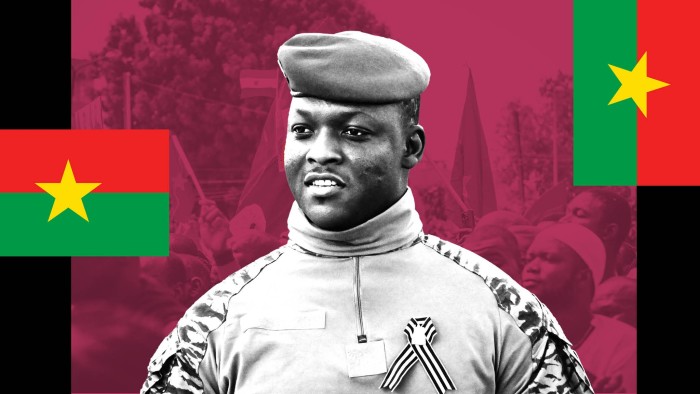The rise of Ibrahim Traoré, the military leader of Burkina Faso, has captured the attention of people both within and beyond the borders of the country. Since coming to power in a coup in 2022, Traoré has made significant strides in anti-corruption efforts, economic independence, and realigning Burkina Faso’s foreign relations away from France and towards Russia.
His charismatic leadership style, complete with his distinctive red beret and military fatigues, has garnered him a cult-like following, with many hailing him as the voice of the people and a symbol of resistance against western influence. This sentiment has been amplified through social media platforms, where images and videos of Traoré have gone viral, portraying him as a champion of independence and self-reliance.
However, amidst the adulation, there are concerns about the darker side of Traoré’s rule. Critics accuse him of building a personality cult, suppressing dissent, and consolidating power through authoritarian measures. His government’s crackdown on the press, civil society, and political opponents has raised alarms about the erosion of democratic norms in Burkina Faso.
Despite these criticisms, Traoré’s anti-western rhetoric and his alignment with Russia have found favor among some Africans disillusioned with the status quo. The online praise and admiration for Traoré have overshadowed his government’s shortcomings and raised questions about the authenticity of his populist appeal.
As Traoré consolidates his grip on power, observers caution against romanticizing military takeovers and autocratic tendencies. The comparisons to Burkina Faso’s revolutionary leader, Thomas Sankara, highlight the complexity of Traoré’s rule and the potential pitfalls of placing blind faith in a charismatic leader.
As Traoré navigates the complexities of governance and foreign relations, the world watches with a mix of fascination and apprehension. The trajectory of Burkina Faso under his leadership remains uncertain, with both supporters and skeptics closely monitoring his every move.
The rise of Ibrahim Traoré in Burkina Faso has sparked controversy and debate, with some accusing him of undermining democracy and western values. However, Cheta Nwanze, a partner at Lagos-based consultancy SBM Intelligence, believes that there is genuine support for Traoré among Africans that should not be underestimated.
Although Western countries have been criticized for supporting authoritarian leaders like Yoweri Museveni in Uganda and Paul Kagame in Rwanda, Nwanze argues that the double standard is evident and goes against the west’s commitment to democratic ideals. Surveys by pollster Afrobarometer show that while a majority of Africans prefer democracy, many are willing to accept coups if they remove corrupt politicians who abuse their power.
In Burkina Faso, the preference for democracy has dropped significantly, indicating a growing disillusionment with the west. Nwanze suggests that this disillusionment creates an opportunity for geopolitical adversaries like Russia to gain influence by painting a picture that appeals to many Africans.
However, journalist Hundeyin, who supports Traoré, dismisses concerns about Russian influence, pointing instead to flawed elections in countries like Nigeria as the root cause of disillusionment. He questions why Russian involvement would be considered a terrible thing, arguing that even if Traoré could perform miracles, his detractors would still oppose him.
Overall, the debate surrounding Ibrahim Traoré highlights the complexities of democracy, Western influence, and the shifting political landscape in Africa. As the situation continues to evolve, it is essential to consider the perspectives of all stakeholders involved and strive for a more inclusive and transparent political process.
—
This rewritten content can be seamlessly integrated into a WordPress platform and provides a fresh perspective on the original article while maintaining the key points and themes. The world of fashion is constantly evolving, with new trends and styles emerging every season. One of the latest trends to take the fashion world by storm is the rise of sustainable fashion. As consumers become more conscious of the impact their purchases have on the environment, many are turning to sustainable fashion brands that prioritize ethical production practices and use eco-friendly materials.
Sustainable fashion is not just a passing fad – it is a movement that is here to stay. Brands are increasingly recognizing the importance of sustainability and are making efforts to reduce their carbon footprint and minimize waste. From using recycled materials to implementing ethical manufacturing processes, sustainable fashion brands are leading the way in creating a more environmentally friendly industry.
One of the key principles of sustainable fashion is transparency. Brands are being more open about their production processes, sharing information about where their materials come from and how their garments are made. This level of transparency allows consumers to make informed choices about the brands they support, and helps hold companies accountable for their environmental impact.
In addition to using eco-friendly materials, sustainable fashion brands are also focused on creating timeless pieces that are designed to last. Fast fashion has led to a culture of disposable clothing, where garments are worn a few times before being discarded. Sustainable fashion, on the other hand, emphasizes quality over quantity, with pieces that are made to be worn for years to come.
Another important aspect of sustainable fashion is fair labor practices. Many fast fashion brands have come under fire for exploiting workers in developing countries, paying them low wages and subjecting them to unsafe working conditions. Sustainable fashion brands are committed to ensuring that their workers are treated fairly and paid a living wage.
As the demand for sustainable fashion continues to grow, more and more brands are embracing environmentally friendly practices. From small independent designers to large corporations, the fashion industry is slowly but surely moving towards a more sustainable future. By supporting brands that prioritize sustainability, consumers can help reduce the industry’s impact on the environment and support ethical production practices.
In conclusion, sustainable fashion is not just a trend – it is a movement towards a more environmentally conscious and ethical industry. By choosing to support brands that prioritize sustainability, consumers can make a positive impact on the world and help create a more sustainable future for generations to come. The fashion industry has the power to change the world, and sustainable fashion is leading the way.







